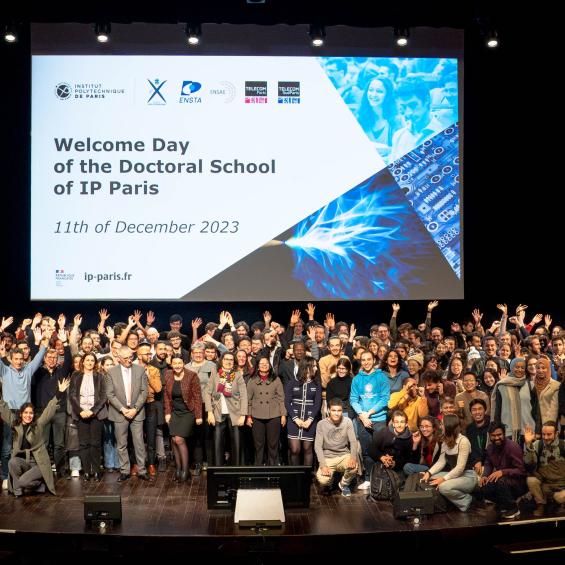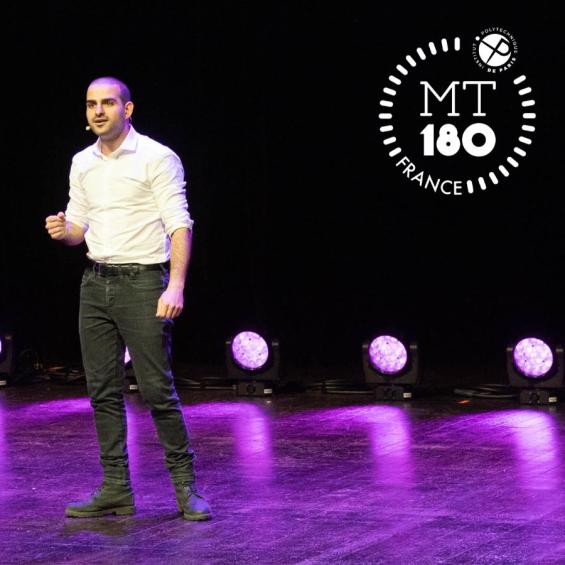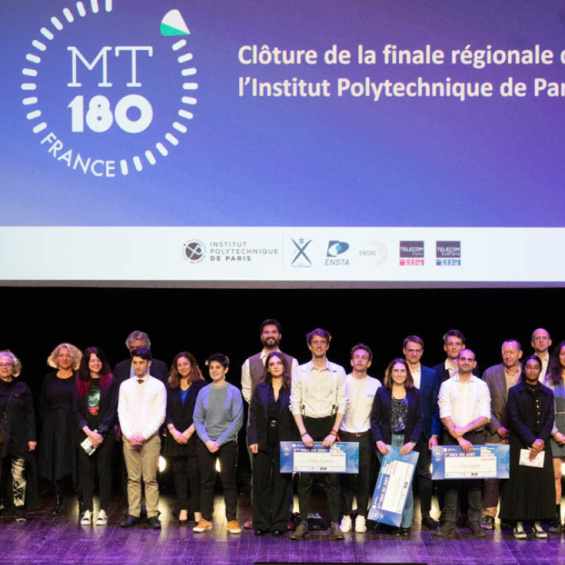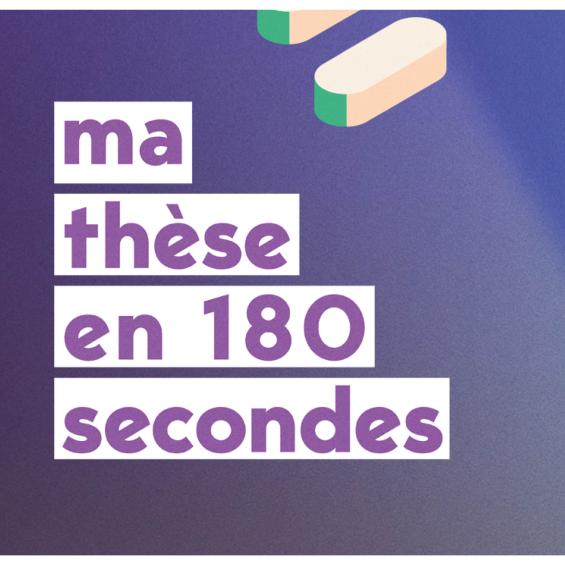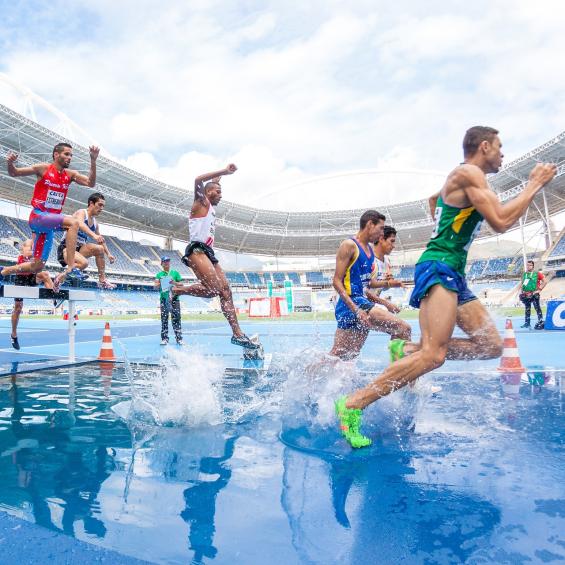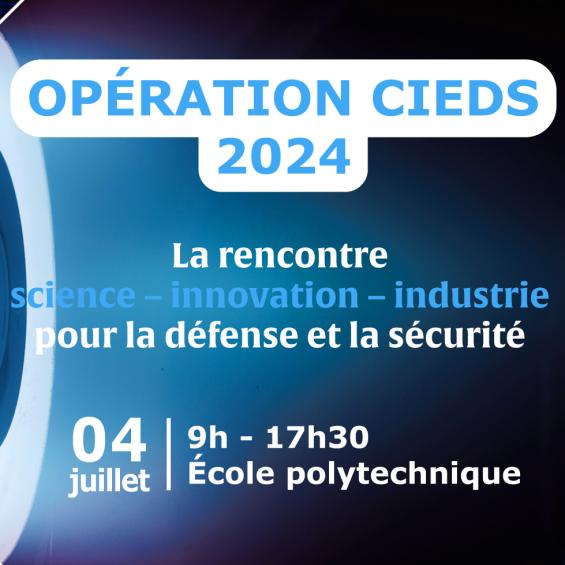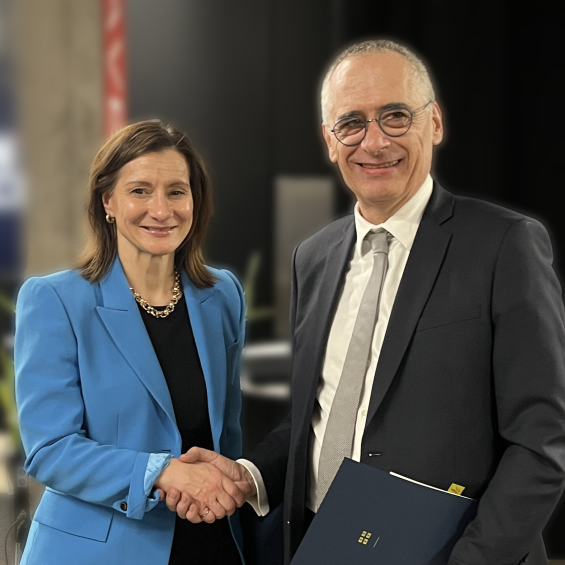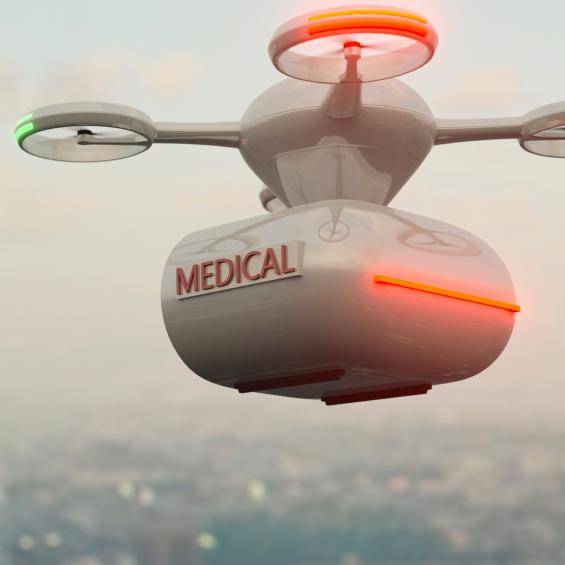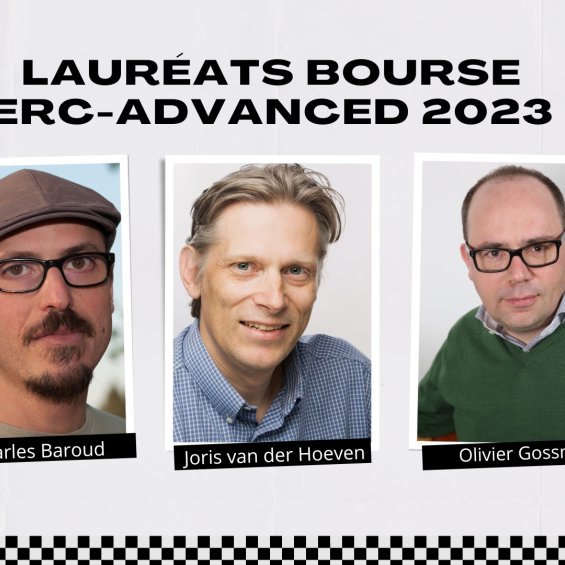PhD Programs
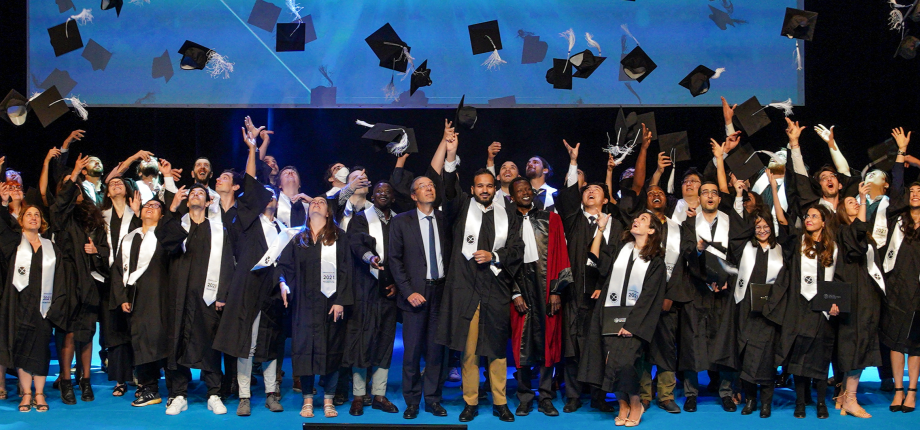
Why pursue a PhD at the Institut Polytechnique de Paris?
As a postgraduate degree whose excellence is recognized worldwide, a PhD degree opens doors to highly skilled jobs in both the private and public sectors. Our doctoral programs are designed to develop outstanding researchers who have a deep understanding of the scientific and practical issues they study. In addition to the academic world, a PhD paves the way for major long-term careers that rely on the specific skills acquired during the doctoral training, which are widely recognized in the socio-economic world for highly qualified employment.
Research partnerships
Institut Polytechnique de Paris welcomes young researchers from diverse backgrounds to its laboratories to work on their thesis research. Whatever the chosen field of study, students will benefit from the partnerships IP Paris has with major national and international research institutes (CNRS, Inria, CEA, Weizmann Institute of Science…).
Institut Polytechnique de Paris also partners with high-tech companies and major multinational groups. The doctoral theses have a strong collaborative component. They benefit from the CIFRE agreement, the numerous Chairs established in IP Paris and the doctoral training networks and European partnerships.
Entrepreneurial support
From the admission and until graduation, PhD students are accompanied. IP Paris provides a personalized follow-up for each PhD student and offers a variety of professional openings, providing the best recruitment opportunities in line with the ambitions of each doctoral student.
The purpose of this support is threefold:
to improve the quality of training
to increase the employability of the doctoral student
to reinforce access to the world of entrepreneurship.
PhD programs at the Institut Polytechnique de Paris
PhD in three years
Institut Polytechnique de Paris will offer 3-year PhD programs in a variety of disciplinary fields. The doctoral research conducted within IP Paris is based on 30 laboratories and takes place in a high-quality scientific environment. PhD students are offered the opportunity to conduct their PhD with companies with renowned R&D departments.
PhD Track in five years
Institut Polytechnique de Paris offers a unique course for students with a bachelor’s degree: the PhD Track. This selective, personalised course allows master’s students to gradually develop their thesis topic. They are immersed in cutting-edge research laboratories, giving them skills to approach future scientific work.
More information about PhD track
Your arrival at l'Institut Polytechnique de Paris
Organization Chart Graduate School
Doctoral School of the Institut Polytechnique de Paris (ED IP Paris)
Within 30 laboratories, ED IP Paris offers a rich PhD training ranging from basic to applied research.
Hadamard Doctoral School of Mathematics (EDMH)
The EDMH brings together all PhDs in fundamental and applied mathematics within the perimeter of the Institut Polytechnique de Paris and the University Paris-Saclay.
Admission
There are two ways to be admitted to a PhD program at Institut Polytechnique de Paris:
- Get into contact with a researcher/professor from one of the IP-Paris laboratories, develop in collaboration with him/her a PhD project and discuss funding possibilities. This is generally done in the middle of the M2 year, when choosing research internships. Once a few compulsory documents have been collected (thesis project, CV, M2 grades, letter of support from the thesis supervisor), one must obtain the agreements from the director of the laboratory and the director of the doctoral school. Then the application can be deposited on ADUM.
- Apply online on the thesis proposals of IP Paris schools
Doctoral programs and funding
The Institut Polytechnique de Paris implements a doctoral admission policy that aims to adhere to the following principles :
Explicit and public criteria and procedures made known to all members of the institution and the potential doctoral candidates
Consideration of the personalized and high-quality supervision within the units and research teams
Recruitment that promotes gender equality, diversity, and openness, particularly on the international level
A recruitment encouraging the development of new research avenues and attentive to consider the professional integration prospects and career development of the doctors
Possible guidance or direction
The Institut Polytechnique de Paris supports multiple types of funding :
- The programs financially supported or coordinated by the Institut Polytechnique de Paris (For example : MESR, AMX, Hi! PARIS, EUR Plasmas, E4C and E4H)
- Supported funding by research organizations (For example : ONERA, CEA and CNRS)
- Supported funding by other organizations
Doctoral contracts examination
The Institut Polytechnique de Paris organizes two calls :
- Early call
- Final call
Admission criteria
The Doctoral School considers in the selection of the doctoral candidates :
- The academic results previously obtained by the candidate, notably during the higher education period
- The candidate’s research ability, particularly evaluated from the beginning of the research internship period
- The alignment between the candidate’s education and the doctoral project
- The originality and the feasibility of the doctoral project within the context of the research unit and its partners
- The doctoral project’s alignment with the scientific policy of the research unit, through the approval of the director of the research unit during the registration
- The availability and the capacity of the thesis directors and all supervisors to ensure the scientific guidance of the doctoral project
- A career project expressed by the candidate and its coherence with the doctoral project
The terms of choice and selection of the doctoral candidates are subject to a procedure defined by the executive office and approved by the Doctoral School council.
Compilation of files
The candidate’s file requires the following information:
- The application form
- Curriculum Vitae
- Cover letter
- M1 & M2 transcripts or other international diplomas
- Two recommendation letters
Terms of examination of files and selection to the interview
- Supervisors’ opinions for each application on its subject
- Laboratory directors’ opinions for each application in their laboratory
- Pre-selection of candidates’ applications by scientific domains of the Doctoral School for the interview, based on the application file
- Each application will be examined by the jury, taking into account the academic background (including internships completed by the candidate), the quality of supervision, the alignment of the candidate’s profile with the thesis topic, and potential interdisciplinarity, and also providing an overall rating
- The IP Paris Arbitration Board/Commission
- Interviews by scientific fields
The interviews can take place in French or English
The interviews shall include the following elements :
- Briefly (~2’): Presentation of the Curriculum Vitae (academic course, internships…)
- Presentation of the thesis subject (~5-10’): The candidates should be able to clearly explain the subject, its challenges and issues as a whole, including the aspects within the field of a discipline other than the candidate’s original subject if it is interdisciplinary
- Briefly (~2’): Motivation for the subject and professional prospects/perspectives.
- The presentation will be followed by a Q&A session (5-10 minutes)
At the end of the auditions, the evaluations could be updated by the members of the disciplinary jury considering the candidates’ performance.
Constitution of the final arbitration board/commission
The jury of the final arbitration will include:(the same person can represent several entities)
- The Director of the IP Paris Doctoral School
- The Director or Deputy Director representing the EDMH
- The Research Vice-President of IP ParisA representative per institution whose thesis funding is concerned by the competition
- A representative of each disciplinary jury
- A representative of each IP Paris Doctoral School field
- A representative of the jury of Hi! PARIS/E4C/E4H/etc
2024 Calendar
Early call
- Deadline for thesis subject deposits on ADUM: January 15, 2024
- Deadline for applications on ADUM: February 15, 2024
- Interview of candidates: From March 6-15, 2024
- Publishing of the early call results: Beginning of April 2024
Final call
- Deadline for thesis subject submission on ADUM: March 15, 2024
- Deadline for applications on ADUM: April 15, 2024
- Interview of candidates: From May 13-24, 2024
- Publishing of the final call results: Beginning of June 2024
CIFRE Thesis
If you need a supporting letter of the Doctoral School for the ANRT of your CIFRE thesis
Comment s'inscrire et se réinscrire ?
- Procédure d'inscription et de réinscription - ED IPP
- Procédure d'inscription et de réinscription - EDMH
Calendrier
La période d'une année universitaire est du 01/09 au 31/08.
Les inscriptions en 1ère année doivent être effectuées entre le 01/09 et le 31/10 (Inscription hors période acceptée selon la date de début du contrat de thèse).
Droit de scolarité
Toute année universitaire commencée est due (total des frais d'inscription, pas de prorata) quelle que soit la date de début de la thèse.
Les doctorants en 4ème année qui soutiennent avant le 31 décembre ne doivent pas se réinscrire, ni payer la cotisation à la CVEC, ni payer les frais de scolarité.
Si vous avez des questions sur les inscriptions/réinscriptions, n'hésitez pas à nous contacter.
Doctoral school IP Paris
Presentation Thesis Monitoring Committee (anual evaluation)
How to prepare for the presentation?
A "presentation" is organized before each re-registration during the duration of the thesis. The provision of the follow-up committee report is a prerequisite for registration for the following year. The presentations are organized under the responsibility and initiative of the thesis supervisor. More information
To request a derogation concerning the duration of the preparation of the thesis - request for extension of the thesis for a defense after December 31
- Derogation on the duration of the thesis
- Declaring a withdrawal from the preparation of a thesis
- Request a transfer to another establishment
- Cesure
Mobilité doctorale IP Paris - Erasmus+
Présentation du dispositif
Profondément impliquée dans la promotion de la mobilité doctorale de ses étudiants en doctorat, IP Paris propose à ces derniers de réaliser des mobilités de recherche de durée variable au sein de laboratoires partenaires à l’échelle internationale. Dans le cadre du programme Erasmus+, ces mobilités s’étendent à divers pays notamment l’Allemagne, l’Autriche, la Belgique, la Bulgarie, Chypre, la Croatie, le Danemark, l’Espagne, l’Estonie, la Finlande, la Grèce, la Hongrie, l’Irlande, l’Islande, l’Italie, la Lettonie, le Liechtenstein, la Lituanie, le Luxembourg, la République de Macédoine du Nord, Malte, la Norvège, les Pays-Bas, la Pologne, le Portugal, la Roumanie, la Serbie, la Slovaquie, la Suède, la République Tchèque et la Turquie.
La mobilité permet aux doctorants
d’accéder à des ressources disponibles uniquement à l’étranger, collecter des données dans un centre de recherche d’un autre pays.
d’étudier, développer des compétences, entamer une coopération dans le cadre d’une thèse.
de recevoir une formation aux compétences transversales et à l’expérience professionnelle/non universitaire, aux compétences en matière de recherche ; recherche de thèse.
La mobilité doctorale dans le cadre du programme Erasmus+ a pour vocation de financer les mobilités en lien avec l’éducation et la formation. Les activités doctorales concentrées uniquement sur la recherche sont financées par le programme Horizon Europe.
Les types de mobilité doctorale dans le cadre du programme Erasmus+
Mobilité longue durée de stage de 2 à 12 mois
Si contractuel
Mobilité de formation de 2 jours à 2 mois
Mobilité d’enseignement de 2 jours à 2 mois
Afin de garantir la reconnaissance académique des activités menées pendant une mobilité doctorale à l’étranger, un contrat d’études sera établi, décrivant les activités réalisées sur place.
Critères d’éligibilités
Être inscrit à une formation doctorale à IP Paris (Ecole doctorale IP Paris ou Ecole doctorale de mathématique Hadamard (EDMH)) dans le périmètre d’une des écoles composantes d’IP Paris (Ecole polytechnique, ENSAE Paris, ENSTA Paris, Telecom Paris, Telecom SudParis) pour l’année 2023-2024.
Pour tous les doctorants, contractuels ou non contractuels
- Mobilité doctorale longue durée de stage (SMT) - de 2 à 12 mois
Objectif de la mobilité de stage : recevoir une formation aux compétences transversales et à l’expérience professionnelle/non universitaire, aux compétences en matière de recherche ; recherche de thèse.
Les organismes éligibles
Toute organisation publique ou privée d’un pays participant au programme ou d’un pays partenaire actif sur le marché du travail ou dans les domaines de l’éducation, de la formation, de la jeunesse, de la recherche et de l’innovation.
Attention, la mobilité ne peut être effectuée dans une structure non éligible : les institutions européennes ou bien tous les organismes financés sur les fonds européens.
Pour les doctorants contractuels seulement
Mobilité des doctorants contractuels (personnels) :
Mobilité de formation : Il s’agit de participer à une activité de formation, de stage, d’observation, au sein d’une entreprise ou d’un établissement de l’enseignement supérieur (y compris cours structurés, programmes intensifs hybrides, formation linguistique, participation à une staff week, à une école d’été…). Durée de l’activité : de 2 jours à 2 mois, hors durée du voyage.
Mobilité d’enseignement : Il s‘agit de dispenser des cours intégrés dans le cursus de l’établissement partenaire. Une activité d’enseignement comprend au minimum 8 heures d’enseignement par semaine. Durée de l’activité : de 2 jours à 2 mois, hors durée du voyage.
Autre information
Un même étudiant peut participer à des périodes de mobilité pour une durée totale maximale de 12 mois de mobilité physique par cycle d’études, indépendamment du nombre et du type d’activités de mobilité : pendant le premier cycle d’études (licence ou équivalent) ; pendant le deuxième cycle d’études (master ou équivalent – niveau 7 du CEC); pendant le troisième cycle d’études, en tant que doctorant (niveau doctorat ou niveau 8 du CEC).
Critères d’attribution pris en compte
Le montant de la bourse attribuée est fixé en fonction du coût de la vie du pays de destination.
Un supplément de 50 Euros est versé si un mode de transport éco responsable (train ou bus) est utilisé pour se rendre dans le pays de destination à l’aller et ainsi qu’au retour sur présentation des justificatifs à la fin de la mobilité.
La bourse est versée en deux fois : 90% au moment du départ en mobilité et 10% au retour après présentation des obligations du doctorant remplies : attestation de stage, compléter le rapport de mobilité sur la plateforme de la Commission Européenne dédiée.
Tableau d’attribution des bourses par montant mensuel et montant journalier en fonction des pays
Procédure
Pièces à fournir
Lettre de soutien de la part du directeur de thèse et du directeur d’unité
La lettre d'acceptation mentionnant l’organisme d’accueil, la durée de la mobilité et l’encadrant sur place
La carte européenne d’assurance maladie (CEAM)
Une attestation d’assurance de responsabilité civile
Un RIB au nom du doctorant émis par une agence bancaire française
CV et lettre de motivation précisant en détail le projet de mobilité
Si vous êtes en situation de handicap, l’attestation de handicap (MDPH).
Candidature à déposer avant le 22/01/2024
Lien pour candidater
Label européen
l’Institut Polytechnique de Paris délivre le label « Doctorat Européen » ou « Doctor Europaeus ». Il s'applique au diplôme national de doctorat, déjà reconnu à l'international dans le cadre du systèmeL.M.D, et qui permet la reconnaissance de la dimension européenne du projet doctoral. En savoir plus
Withdrawal of diplomas
During the doctoral graduation ceremony:
Please go to the graduation office present at the ceremony, with a valid identity document (French national identity card, passport, driving license)
Come and collect your diploma from your institution’s education service
Please go to doctoral school administration office during the opening hours, with a valid identity document (French national identity card, passport, driving license). The administration office will get in touch with you when the diploma is ready
Have it collected from the administration office by a third party
Establish a power of attorney for this third party (see Annex 1).
Provide a copy of the PhD’s valid identity document and inform the third party that he/she will have to bring his/her valid identity document (French national identity card, passport, driving license)
Please send an email to the administration office and attach the requested documents to this e-mail.
The administration office will get in touch with you when the diploma is ready.
Receive your diploma in a French consulate or Embassy abroad:
The diploma will be sent via the diplomatic bag service to the French embassy concerned: find the French consulate or embassy abroad closest to the place of your residence abroad
Make a request to send the diploma abroad (see Annex 2)
You need to provide a document showing your residence abroad, and Provide a copy of a valid identity document (French national identity card, passport, driving license)
Please send an email to the administration office and attach the requested documents to this e-mail.
The administration office will get in touch with you when the diploma is ready.
PhD Thesis Award
The Institut Polytechnique de Paris will award annually three prizes to the students who have produced the best PhD thesis and made the most outstanding contributions in one of the following fields: Physics; Biology and Chemistry; Information, Communications, Electronics; Computer Science, Data, and Artificial Intelligence; Engineering, Mechanics, and Energetics; Economics, Management, and Social Sciences and Mathematics.
- PhD thesis awards 2022
- PhD thesis awards 2023
Reference texts - Legal framework
The Golden Rules for PhD supervision provide a set of best practices for both PhD students and supervisors. These rules emphasise the shared responsibility and expectations of both the supervisor and PhD student.
2023 PhD Graduation Ceremony
The IP-Paris PhD graduation ceremony will take place on Friday May 26th, 2023 at amphithéâtre Poincaré at Ecole Polytechnique.
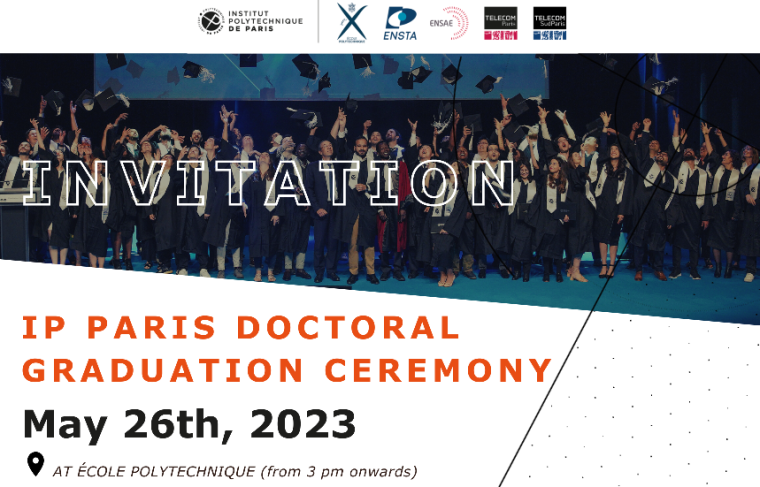
__________________________________________________________________________________________________________
Contact
- Enrollment/Re-enrollment
- Procédure of thesis defense
- Césures
- International Co-supervision
- Thesis under a CIFRE agreement. If you need a letter of support from the doctoral school for your CIFRE thesis, complete this form.
- Graduation
- Training courses
- Organization Chart Graduate School
Address
Graduate School IP Paris pôle Doctorat
Télécom Paris
19, place Marguerite Perey
5ème étage - CS 20031
F-91123 Palaiseau Cedex
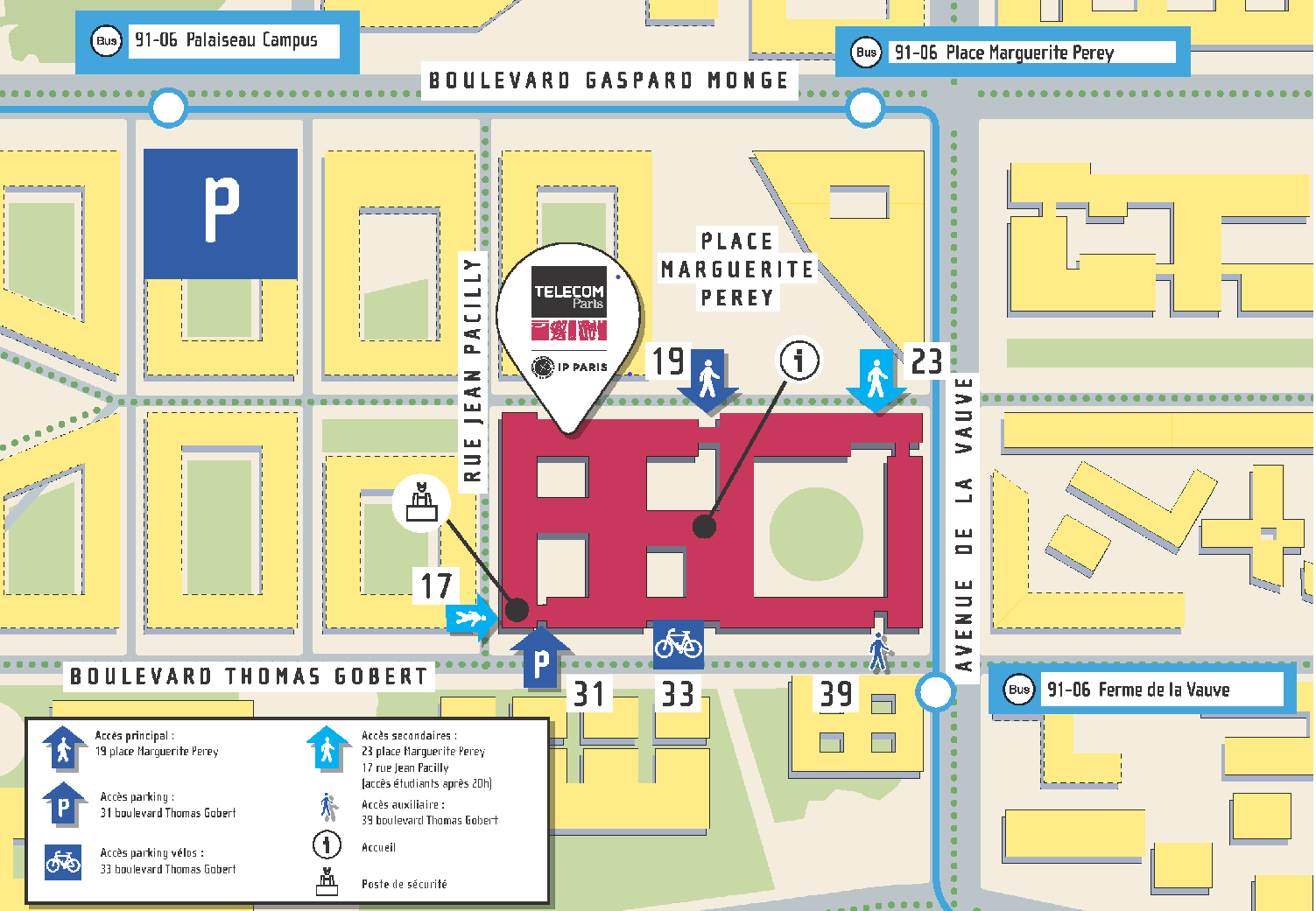
Why pursue a PhD at the Institut Polytechnique de Paris?
As a postgraduate degree whose excellence is recognized worldwide, a PhD degree opens doors to highly skilled jobs in both the private and public sectors. Our doctoral programs are designed to develop outstanding researchers who have a deep understanding of the scientific and practical issues they study. In addition to the academic world, a PhD paves the way for major long-term careers that rely on the specific skills acquired during the doctoral training, which are widely recognized in the socio-economic world for highly qualified employment.
Research partnerships
Institut Polytechnique de Paris welcomes young researchers from diverse backgrounds to its laboratories to work on their thesis research. Whatever the chosen field of study, students will benefit from the partnerships IP Paris has with major national and international research institutes (CNRS, Inria, CEA, Weizmann Institute of Science…).
Institut Polytechnique de Paris also partners with high-tech companies and major multinational groups. The doctoral theses have a strong collaborative component. They benefit from the CIFRE agreement, the numerous Chairs established in IP Paris and the doctoral training networks and European partnerships.
Entrepreneurial support
From the admission and until graduation, PhD students are accompanied. IP Paris provides a personalized follow-up for each PhD student and offers a variety of professional openings, providing the best recruitment opportunities in line with the ambitions of each doctoral student.
The purpose of this support is threefold:
to improve the quality of training
to increase the employability of the doctoral student
to reinforce access to the world of entrepreneurship.
PhD programs at the Institut Polytechnique de Paris
PhD in three years
Institut Polytechnique de Paris will offer 3-year PhD programs in a variety of disciplinary fields. The doctoral research conducted within IP Paris is based on 30 laboratories and takes place in a high-quality scientific environment. PhD students are offered the opportunity to conduct their PhD with companies with renowned R&D departments.
PhD Track in five years
Institut Polytechnique de Paris offers a unique course for students with a bachelor’s degree: the PhD Track. This selective, personalised course allows master’s students to gradually develop their thesis topic. They are immersed in cutting-edge research laboratories, giving them skills to approach future scientific work.
More information about PhD track
Your arrival at l'Institut Polytechnique de Paris
Organization Chart Graduate School
Doctoral School of the Institut Polytechnique de Paris (ED IP Paris)
Within 30 laboratories, ED IP Paris offers a rich PhD training ranging from basic to applied research.
Hadamard Doctoral School of Mathematics (EDMH)
The EDMH brings together all PhDs in fundamental and applied mathematics within the perimeter of the Institut Polytechnique de Paris and the University Paris-Saclay.
Admission
There are two ways to be admitted to a PhD program at Institut Polytechnique de Paris:
- Get into contact with a researcher/professor from one of the IP-Paris laboratories, develop in collaboration with him/her a PhD project and discuss funding possibilities. This is generally done in the middle of the M2 year, when choosing research internships. Once a few compulsory documents have been collected (thesis project, CV, M2 grades, letter of support from the thesis supervisor), one must obtain the agreements from the director of the laboratory and the director of the doctoral school. Then the application can be deposited on ADUM.
- Apply online on the thesis proposals of IP Paris schools
Doctoral programs and funding
The Institut Polytechnique de Paris implements a doctoral admission policy that aims to adhere to the following principles :
Explicit and public criteria and procedures made known to all members of the institution and the potential doctoral candidates
Consideration of the personalized and high-quality supervision within the units and research teams
Recruitment that promotes gender equality, diversity, and openness, particularly on the international level
A recruitment encouraging the development of new research avenues and attentive to consider the professional integration prospects and career development of the doctors
Possible guidance or direction
The Institut Polytechnique de Paris supports multiple types of funding :
- The programs financially supported or coordinated by the Institut Polytechnique de Paris (For example : MESR, AMX, Hi! PARIS, EUR Plasmas, E4C and E4H)
- Supported funding by research organizations (For example : ONERA, CEA and CNRS)
- Supported funding by other organizations
Doctoral contracts examination
The Institut Polytechnique de Paris organizes two calls :
- Early call
- Final call
Admission criteria
The Doctoral School considers in the selection of the doctoral candidates :
- The academic results previously obtained by the candidate, notably during the higher education period
- The candidate’s research ability, particularly evaluated from the beginning of the research internship period
- The alignment between the candidate’s education and the doctoral project
- The originality and the feasibility of the doctoral project within the context of the research unit and its partners
- The doctoral project’s alignment with the scientific policy of the research unit, through the approval of the director of the research unit during the registration
- The availability and the capacity of the thesis directors and all supervisors to ensure the scientific guidance of the doctoral project
- A career project expressed by the candidate and its coherence with the doctoral project
The terms of choice and selection of the doctoral candidates are subject to a procedure defined by the executive office and approved by the Doctoral School council.
Compilation of files
The candidate’s file requires the following information:
- The application form
- Curriculum Vitae
- Cover letter
- M1 & M2 transcripts or other international diplomas
- Two recommendation letters
Terms of examination of files and selection to the interview
- Supervisors’ opinions for each application on its subject
- Laboratory directors’ opinions for each application in their laboratory
- Pre-selection of candidates’ applications by scientific domains of the Doctoral School for the interview, based on the application file
- Each application will be examined by the jury, taking into account the academic background (including internships completed by the candidate), the quality of supervision, the alignment of the candidate’s profile with the thesis topic, and potential interdisciplinarity, and also providing an overall rating
- The IP Paris Arbitration Board/Commission
- Interviews by scientific fields
The interviews can take place in French or English
The interviews shall include the following elements :
- Briefly (~2’): Presentation of the Curriculum Vitae (academic course, internships…)
- Presentation of the thesis subject (~5-10’): The candidates should be able to clearly explain the subject, its challenges and issues as a whole, including the aspects within the field of a discipline other than the candidate’s original subject if it is interdisciplinary
- Briefly (~2’): Motivation for the subject and professional prospects/perspectives.
- The presentation will be followed by a Q&A session (5-10 minutes)
At the end of the auditions, the evaluations could be updated by the members of the disciplinary jury considering the candidates’ performance.
Constitution of the final arbitration board/commission
The jury of the final arbitration will include:(the same person can represent several entities)
- The Director of the IP Paris Doctoral School
- The Director or Deputy Director representing the EDMH
- The Research Vice-President of IP ParisA representative per institution whose thesis funding is concerned by the competition
- A representative of each disciplinary jury
- A representative of each IP Paris Doctoral School field
- A representative of the jury of Hi! PARIS/E4C/E4H/etc
2024 Calendar
Early call
- Deadline for thesis subject deposits on ADUM: January 15, 2024
- Deadline for applications on ADUM: February 15, 2024
- Interview of candidates: From March 6-15, 2024
- Publishing of the early call results: Beginning of April 2024
Final call
- Deadline for thesis subject submission on ADUM: March 15, 2024
- Deadline for applications on ADUM: April 15, 2024
- Interview of candidates: From May 13-24, 2024
- Publishing of the final call results: Beginning of June 2024
CIFRE Thesis
If you need a supporting letter of the Doctoral School for the ANRT of your CIFRE thesis
Comment s'inscrire et se réinscrire ?
- Procédure d'inscription et de réinscription - ED IPP
- Procédure d'inscription et de réinscription - EDMH
Calendrier
La période d'une année universitaire est du 01/09 au 31/08.
Les inscriptions en 1ère année doivent être effectuées entre le 01/09 et le 31/10 (Inscription hors période acceptée selon la date de début du contrat de thèse).
Droit de scolarité
Toute année universitaire commencée est due (total des frais d'inscription, pas de prorata) quelle que soit la date de début de la thèse.
Les doctorants en 4ème année qui soutiennent avant le 31 décembre ne doivent pas se réinscrire, ni payer la cotisation à la CVEC, ni payer les frais de scolarité.
Si vous avez des questions sur les inscriptions/réinscriptions, n'hésitez pas à nous contacter.
Doctoral school IP Paris
Presentation Thesis Monitoring Committee (anual evaluation)
How to prepare for the presentation?
A "presentation" is organized before each re-registration during the duration of the thesis. The provision of the follow-up committee report is a prerequisite for registration for the following year. The presentations are organized under the responsibility and initiative of the thesis supervisor. More information
To request a derogation concerning the duration of the preparation of the thesis - request for extension of the thesis for a defense after December 31
- Derogation on the duration of the thesis
- Declaring a withdrawal from the preparation of a thesis
- Request a transfer to another establishment
- Cesure
Mobilité doctorale IP Paris - Erasmus+
Présentation du dispositif
Profondément impliquée dans la promotion de la mobilité doctorale de ses étudiants en doctorat, IP Paris propose à ces derniers de réaliser des mobilités de recherche de durée variable au sein de laboratoires partenaires à l’échelle internationale. Dans le cadre du programme Erasmus+, ces mobilités s’étendent à divers pays notamment l’Allemagne, l’Autriche, la Belgique, la Bulgarie, Chypre, la Croatie, le Danemark, l’Espagne, l’Estonie, la Finlande, la Grèce, la Hongrie, l’Irlande, l’Islande, l’Italie, la Lettonie, le Liechtenstein, la Lituanie, le Luxembourg, la République de Macédoine du Nord, Malte, la Norvège, les Pays-Bas, la Pologne, le Portugal, la Roumanie, la Serbie, la Slovaquie, la Suède, la République Tchèque et la Turquie.
La mobilité permet aux doctorants
d’accéder à des ressources disponibles uniquement à l’étranger, collecter des données dans un centre de recherche d’un autre pays.
d’étudier, développer des compétences, entamer une coopération dans le cadre d’une thèse.
de recevoir une formation aux compétences transversales et à l’expérience professionnelle/non universitaire, aux compétences en matière de recherche ; recherche de thèse.
La mobilité doctorale dans le cadre du programme Erasmus+ a pour vocation de financer les mobilités en lien avec l’éducation et la formation. Les activités doctorales concentrées uniquement sur la recherche sont financées par le programme Horizon Europe.
Les types de mobilité doctorale dans le cadre du programme Erasmus+
Mobilité longue durée de stage de 2 à 12 mois
Si contractuel
Mobilité de formation de 2 jours à 2 mois
Mobilité d’enseignement de 2 jours à 2 mois
Afin de garantir la reconnaissance académique des activités menées pendant une mobilité doctorale à l’étranger, un contrat d’études sera établi, décrivant les activités réalisées sur place.
Critères d’éligibilités
Être inscrit à une formation doctorale à IP Paris (Ecole doctorale IP Paris ou Ecole doctorale de mathématique Hadamard (EDMH)) dans le périmètre d’une des écoles composantes d’IP Paris (Ecole polytechnique, ENSAE Paris, ENSTA Paris, Telecom Paris, Telecom SudParis) pour l’année 2023-2024.
Pour tous les doctorants, contractuels ou non contractuels
- Mobilité doctorale longue durée de stage (SMT) - de 2 à 12 mois
Objectif de la mobilité de stage : recevoir une formation aux compétences transversales et à l’expérience professionnelle/non universitaire, aux compétences en matière de recherche ; recherche de thèse.
Les organismes éligibles
Toute organisation publique ou privée d’un pays participant au programme ou d’un pays partenaire actif sur le marché du travail ou dans les domaines de l’éducation, de la formation, de la jeunesse, de la recherche et de l’innovation.
Attention, la mobilité ne peut être effectuée dans une structure non éligible : les institutions européennes ou bien tous les organismes financés sur les fonds européens.
Pour les doctorants contractuels seulement
Mobilité des doctorants contractuels (personnels) :
Mobilité de formation : Il s’agit de participer à une activité de formation, de stage, d’observation, au sein d’une entreprise ou d’un établissement de l’enseignement supérieur (y compris cours structurés, programmes intensifs hybrides, formation linguistique, participation à une staff week, à une école d’été…). Durée de l’activité : de 2 jours à 2 mois, hors durée du voyage.
Mobilité d’enseignement : Il s‘agit de dispenser des cours intégrés dans le cursus de l’établissement partenaire. Une activité d’enseignement comprend au minimum 8 heures d’enseignement par semaine. Durée de l’activité : de 2 jours à 2 mois, hors durée du voyage.
Autre information
Un même étudiant peut participer à des périodes de mobilité pour une durée totale maximale de 12 mois de mobilité physique par cycle d’études, indépendamment du nombre et du type d’activités de mobilité : pendant le premier cycle d’études (licence ou équivalent) ; pendant le deuxième cycle d’études (master ou équivalent – niveau 7 du CEC); pendant le troisième cycle d’études, en tant que doctorant (niveau doctorat ou niveau 8 du CEC).
Critères d’attribution pris en compte
Le montant de la bourse attribuée est fixé en fonction du coût de la vie du pays de destination.
Un supplément de 50 Euros est versé si un mode de transport éco responsable (train ou bus) est utilisé pour se rendre dans le pays de destination à l’aller et ainsi qu’au retour sur présentation des justificatifs à la fin de la mobilité.
La bourse est versée en deux fois : 90% au moment du départ en mobilité et 10% au retour après présentation des obligations du doctorant remplies : attestation de stage, compléter le rapport de mobilité sur la plateforme de la Commission Européenne dédiée.
Tableau d’attribution des bourses par montant mensuel et montant journalier en fonction des pays
Procédure
Pièces à fournir
Lettre de soutien de la part du directeur de thèse et du directeur d’unité
La lettre d'acceptation mentionnant l’organisme d’accueil, la durée de la mobilité et l’encadrant sur place
La carte européenne d’assurance maladie (CEAM)
Une attestation d’assurance de responsabilité civile
Un RIB au nom du doctorant émis par une agence bancaire française
CV et lettre de motivation précisant en détail le projet de mobilité
Si vous êtes en situation de handicap, l’attestation de handicap (MDPH).
Candidature à déposer avant le 22/01/2024
Lien pour candidater
Label européen
l’Institut Polytechnique de Paris délivre le label « Doctorat Européen » ou « Doctor Europaeus ». Il s'applique au diplôme national de doctorat, déjà reconnu à l'international dans le cadre du systèmeL.M.D, et qui permet la reconnaissance de la dimension européenne du projet doctoral. En savoir plus
Withdrawal of diplomas
During the doctoral graduation ceremony:
Please go to the graduation office present at the ceremony, with a valid identity document (French national identity card, passport, driving license)
Come and collect your diploma from your institution’s education service
Please go to doctoral school administration office during the opening hours, with a valid identity document (French national identity card, passport, driving license). The administration office will get in touch with you when the diploma is ready
Have it collected from the administration office by a third party
Establish a power of attorney for this third party (see Annex 1).
Provide a copy of the PhD’s valid identity document and inform the third party that he/she will have to bring his/her valid identity document (French national identity card, passport, driving license)
Please send an email to the administration office and attach the requested documents to this e-mail.
The administration office will get in touch with you when the diploma is ready.
Receive your diploma in a French consulate or Embassy abroad:
The diploma will be sent via the diplomatic bag service to the French embassy concerned: find the French consulate or embassy abroad closest to the place of your residence abroad
Make a request to send the diploma abroad (see Annex 2)
You need to provide a document showing your residence abroad, and Provide a copy of a valid identity document (French national identity card, passport, driving license)
Please send an email to the administration office and attach the requested documents to this e-mail.
The administration office will get in touch with you when the diploma is ready.
PhD Thesis Award
The Institut Polytechnique de Paris will award annually three prizes to the students who have produced the best PhD thesis and made the most outstanding contributions in one of the following fields: Physics; Biology and Chemistry; Information, Communications, Electronics; Computer Science, Data, and Artificial Intelligence; Engineering, Mechanics, and Energetics; Economics, Management, and Social Sciences and Mathematics.
- PhD thesis awards 2022
- PhD thesis awards 2023
The Golden Rules for PhD supervision provide a set of best practices for both PhD students and supervisors. These rules emphasise the shared responsibility and expectations of both the supervisor and PhD student.
2023 PhD Graduation Ceremony
The IP-Paris PhD graduation ceremony will take place on Friday May 26th, 2023 at amphithéâtre Poincaré at Ecole Polytechnique.

__________________________________________________________________________________________________________
Contact
- Enrollment/Re-enrollment
- Procédure of thesis defense
- Césures
- International Co-supervision
- Thesis under a CIFRE agreement. If you need a letter of support from the doctoral school for your CIFRE thesis, complete this form.
- Graduation
- Training courses
- Organization Chart Graduate School
Address
Graduate School IP Paris pôle Doctorat
Télécom Paris
19, place Marguerite Perey
5ème étage - CS 20031
F-91123 Palaiseau Cedex














